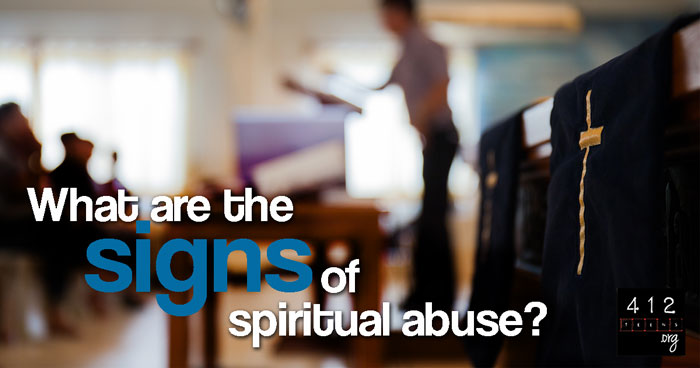What are some signs of spiritual abuse?

Spiritual abuse is when someone uses God, Scripture, or their authority in the church to control, manipulate, or shame others. That is NOT how God works. He is NEVER OK with abuse (Matthew 23; 1 Peter 5:1-3).
Abusers can be very sneaky. Often victims of abuse won't even realize they're being abused until they have gotten distance from the abusive environment or person.
One way abusers keep their victims unaware of their mistreatment is through gaslighting. Gaslighting is when the cause or blame for a negative situation is manipulated to appear as the fault of the victim or when the victim is made to believe the experience didn't happen in the way they remember or that it didn't happen at all.
In a spiritually-abusive environment, gaslighting is often used to weaken the victim's confidence in their own ability to discern truth from lies. The victim has been effectively dehumanized and made to feel invalid and inferior, thus leading them to doubt whether they can even perceive anything correctly at all. The victim then enters a state of suggestibility and vulnerability, making it difficult to detect further signs of abuse.
Spiritual Abuse Sign #1: Claiming Exclusive Access to "Truth"
"Jesus said to him, 'I am the way, and the truth, and the life. No one comes to the Father except through me.'" —John 14:6
The Bible says that Jesus is the only way to salvation. But abusers take that a step further, declaring that only their interpretation of Scripture is accurate, and the rest of the Christian Church is "blinded," "deceived," or in some way spiritually inferior. These people or organizations may claim that any interpretation of Scripture other than their own (on all matters, even small ones) will lead to hellfire, and that to leave their "care" would result in unimaginable horrors. Thus, many of their flock remain in the abusive environment out of fear.
"Every word of God proves true; he is a shield to those who take refuge in him. Do not add to his words, lest he rebuke you and you be found a liar." —Proverbs 30:5-6
Spiritual Abuse Sign #2: Shame-Driven Performance
Many spiritual abusers will place excessive emphasis on performance and keeping up appearances, catalyzed by shame. For example, a church might pressure their members to attend all meetings, all events, volunteer constantly, and request weekly reports on evangelism efforts. If a member fails to meet these expectations, they may be shamed or made to feel guilty. They may be criticized for not praying rightly/enough or punished for participating in events or communities outside of their own organization.

Even such small comments like, "Would God really want you to go to the movies with your school friends instead of volunteering at the Harvest Festival?" could be a sign of the speaker's own poor theology. Evaluating your personal priorities and motivations is totally fine (Galatians 6:3-5; James 1:23-25), but no one should be allowed to pressure you into feeling guilt or shame over your decisions. Shame-driven "guidance" is not from God.
"Let no corrupting talk come out of your mouths, but only such as is good for building up, as fits the occasion, that it may give grace to those who hear." —Ephesians 4:29
Spiritual Abuse Sign #3: Spiritual Leadership = Ultimate Authority
"Obey your leaders and submit to them, for they are keeping watch over your souls, as those who will have to give an account. Let them do this with joy and not with groaning, for that would be of no advantage to you." —Hebrews 13:17
Spiritually-abusive leaders may misuse this verse to demand absolute compliance and blind allegiance. A clear sign of a spiritually-abusive leader is if they claim their leadership is on par with God's own authority. They may label any attempts at accountability as sinful, divisive, or insubordinate.

But the Bible warns us that false teachers are a thing (2 Peter 2). We should never just "take someone's word for it" without comparing their claim to Truth against Scripture. Instead, we're supposed to be like the Bereans in Acts 17:10-15.
"Now these Jews were more noble than those in Thessalonica; they received the word with all eagerness, examining the Scriptures daily to see if these things were so." —Acts 17:11
Our loyalty should always be to Jesus, who is the true Head of the Church (Ephesians 1:22)—not a particular organization, church, or leader.
Spiritual Abuse Sign #4: Thought/Information Control
A spiritually-abusive organization will likely try to control the narrative, which means they may explain a situation how they wish it to be perceived before someone else can present their own story. For example, if a church member has been abused by a deacon and says they will expose them, the leader may make an announcement to the congregation that the member has started to spread rumors to slander the leadership before the victim gets a chance to speak about the abuse to their friends. Now, when the victim tries to talk to their church friends, they have already been discredited by the leadership and are unlikely to be believed. The leadership may never even address the abuse accusation directly.
If a spiritual leader is unwilling to have his integrity tested, gains a reputation for unsubstantiated denial, and discourages investigation, his character may be legitimately in question. 1 Peter 3:16b says, "When you are slandered, those who revile your good behavior in Christ may be put to shame."
Spiritual Abuse Sign #5: Extreme Isolation
Spiritually abusive organizations often encourage and foster extreme isolation. Influences outside the abusive community may be labeled as dangerous, misleading, or contaminating. Many spiritually-abusive groups convince the victim that any contact outside of the group would lead to corruption, God's anger, or loss of salvation.
This type of fear-based isolation also removes any relationships that may help the victim get on their feet outside of the community if/when the victim realizes the dangers of the abusive community. When the victim has nowhere else to go—because their job, family, etc. may be tied to the group as well—they may feel trapped in the toxic environment.

Accountability and Forgiveness
Receiving a command to "just forgive them because people make mistakes" is incredibly painful to the survivor of abuse. It discounts their painful experiences and isolates them even further. This also discredits our God as one of justice AND mercy.
Yes, the Bible tells us to forgive (Matthew 18:21-22). And, yes, some people are led to stay in abusive organizations to minister to those still lost in darkness of the community. But we are also instructed to be "as wise as serpents and innocent as doves" (Matthew 10:16). 2 Peter 2 warns us of false teachers and prophets. Paul repeatedly chews out the Corinthians for their behavior.
Forgiveness is needed for the survivor to heal, but forgiveness does not mean trusting, endorsing, defending, or returning to that abusive community. Forgiveness also doesn't excuse the abusive community from being accountable to God for their actions.
Healing from spiritual abuse takes time. The same goes for learning to forgive a spiritual abuser and establishing healthy spiritual boundaries for the future. But we have a God who values justice (Romans 12:18-19), who values us (Matthew 10:29-31), and who grants us open access to His grace even when we are broken.
"Let us then approach God's throne of grace with confidence, so that we may receive mercy and find grace to help us in our time of need." —Hebrews 4:16
ALSO SEE:
- What is spiritual abuse?
- Is God mad at me?
- How do I stop thinking of God as imposing and angry?
- God Doesn't Want You to Be Miserable
- What does the Bible say about legalism?
- What is spiritual discernment?
- What are spiritual boundaries?
- How can I stop feeling guilty?
- Hating Sin Doesn't Mean Hating Yourself
- Will God forgive me no matter what?
- Feeling Loved When You Don't Feel Loveable
- How can I overcome feeling overwhelmed?
- How to Have Healthy Boundaries
- How can I forgive those who sin against me?
- What does the Bible say about dealing with toxic relationships?


TL;DR
Victims of spiritual abuse often won't see the abuse until they leave the environment. Major signs of spiritual abuse: 1. Claims to Exclusive "Truth" (no one understands God's Word but them); 2. Shame-Driven Performance (pressure to "perform" upon penalty of being a "bad Christian"); 3. Spiritual Leadership = Ultimate Authority (do not question leadership); 4. Information Control (discrediting victim's story without investigation); 5. Extreme Isolation (outside influences discouraged/criticized). All spiritual communities are made up of people who are flawed. The Bible tells us to forgive, but forgiveness doesn't remove an abuser's accountability for their actions. Leaving an abusive community and seeking help is a sign of wisdom (Matthew 10:16).

Writer/Editor: September Grace
September is an avid film nerd from growing up on weekend trips to Universal Studios Hollywood. She is passionate about the intersections of Christian spirituality, faith, and storytelling in popular culture. Outside of 412teens and digging up obscure horror flicks from the 2000s, she works as a freelance developmental editor and acquisitions consultant while comforting her clingy feline floof, Faust, from the anxiety of existence.
